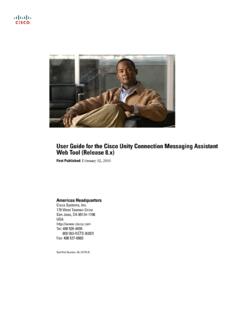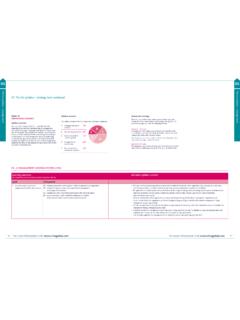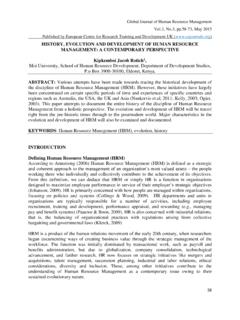Transcription of Sexual Harassment Awareness Training FAQs for Supervisors ...
1 John R. Kasich, Governor Robert Blair, Director Gregory L. Williams, Deputy Director Equal Opportunity Division | 4200 Surface Road | Columbus, Ohio 43228 Phone: 614-466-8380 | Fax: 614-728-5628 | Email: The State of Ohio is a diverse, inclusive and equal opportunity employer. Sexual Harassment Awareness Training FAQs for Supervisors and Managers Q. What is Sexual Harassment ? A. Sexual Harassment is a form of sex discrimination and is prohibited by Title VII of the Civil Rights act of 1964, Ohio Revised Code , Ohio Administrative Code 123:1-49, the Anti-Discrimination Policy in State Government Executive Order 2011-05K, and state agency policy. Unwelcome Sexual advances, requests for Sexual favors, or other hostile conduct that targets someone based on gender constitutes Sexual Harassment when that conduct explicitly or implicitly effects a person s employment, unreasonably interferes with a person s work performance, or creates a work environment that is intimidating, hostile, or offensive.
2 Q. What can I do to prevent Sexual Harassment in my workplace? A. There are many things a supervisor or manager can do to prevent Sexual Harassment , including: Read and understand your agency s Sexual Harassment policy. Understand what Sexual Harassment is and what behaviors are inappropriate. Ensure that your employees are familiar with and have access to your agency s Sexual Harassment policy; post the policy in a prominent place and distribute copies to employees. Make sure employees receive regular Training to educate them about Sexual Harassment and how to report it. Make yourself available to employees; allow employees a space to report incidents of Harassment . If employees have a difficult time discussing these issues directly, you could create an office suggestion box, where employees could voice concerns anonymously. If a complaint is being investigated, be sure to be both neutral and objective.
3 During the investigation and possible discipline of a harasser, coworkers may feel angry or threatened by the complainant. Be sure to stop rumors and offensive actions by coworkers immediately if an incident occurs. Demonstrate clearly that this behavior will not be tolerated. Monitor the conduct and environment of your workplace. Maintain a zero-tolerance policy for Sexual Harassment in the workplace and take immediate action to address inappropriate behavior before it escalates or creates a hostile work environment. Q. Where does unprofessional behavior stop and illegal Sexual Harassment start? A. The legal grounds for committing Sexual Harassment are quite rigorous: one must show that there was severe or pervasive unwelcome Sexual conduct, or a hostile work environment that is filled with Sexual innuendo, abuse, or insults. Is every single Sexual joke by itself illegal?
4 Probably not, but is it unprofessional. Unprofessional conduct is defined as disrespectful, inconsiderate, or impolite behavior. While not every single off-color statement is illegal, they are all unprofessional and do not belong in the workplace. Q. Why should prevention include putting a stop to unprofessional behavior? A. Unprofessional behavior, while legal, can lead to many problems, including Sexual Harassment . If unprofessional behavior is ignored or allowed to flourish it can easily get out of hand. This impacts the work-culture. While one off-color remark may not meet the legal definition of Sexual Harassment , it is rare that one remark comes alone. If others see that it is tolerated they may well assume that they too can participate in this type of behavior. One remark leads to another and soon the workplace is filled with Sexual innuendo, abuse, or insults. The purpose of prevention is to stop the behavior before it reaches this point.
5 Supervisors and managers have extra responsibility to make sure this type of behavior is not allowed to flourish under their watch. Ohio Department of Administrative Services Sexual Harassment Manager and Supervisor FAQs Page 2 Q. Can I be held liable for Sexual Harassment that occurs in my workplace? A. Yes, Supervisors and managers can be held liable for Sexual Harassment that occurs under their management. If you are made aware of sexually harassing behavior in your workplace, it is your responsibility to address it. If you fail to address Sexual Harassment when it is brought to your attention, you and the state may be held liable. Q. Can consensual Sexual relations between a supervisor and subordinate be considered Sexual Harassment ? A. Yes, while a consensual Sexual relationship between a supervisor and a subordinate is not prohibited by law, it will always have consequences, some of which can be considered Sexual Harassment .
6 Your agency policy may outright prohibit this type of relationship. It is important for managers to maintain high standards of professionalism, fairness, and impartiality in their supervision of employees. These standards may be compromised, or at least the appearance of neutrality will be compromised, if a manager engages in a Sexual relationship with a subordinate. It is difficult to give an impartial performance review to someone with whom you are involved in a Sexual relationship. Moreover, if the relationship between the supervisor and the employee ends or creates a hostile environment for others, then it may form the basis upon which a Sexual Harassment complaint could be filed. For professional reasons, these relationships should be avoided and, if one occurs, both individuals may want to consider the possibility of transfer. Q. What should I do to help a complaining employee?
7 A. Provide the complaining employee with appropriate information for how to access the internal complaint process, and act to address the issue immediately. Ensure the employee is aware that they may not be retaliated against for making a complaint. Check back in with the employee regularly to make sure the Harassment has been adequately addressed and that no retaliation has occurred. Q. My staff are ignoring/shunning someone who has complained, what should I do about it? A. This could be considered retaliation and could be the basis for a second complaint. These are difficult situations and should be handled with care. Call your equal opportunity officer or human resources specialist to help deal with this situation. Shunning and rumors create an uncomfortable, unacceptable work environment. Have the manager involved intervene, with the help of a specialist if necessary, and address the specific individuals regarding their participation in the ignoring/shunning.
8 This needs to be done tactfully so that the privacy of the individuals involved is not violated. Employees should be told they do need to work together in a professional and respectful manner. Q. What records should I make? A. Document everything! The importance of documenting everything, such as conversations with involved parties, cannot be overstated. Keep all evidence of the Harassment and make this evidence available to the investigator if an investigation becomes necessary. Document all actions you took, if any, to resolve the situation. Document everything you witness, everything you do, what you say and who is present or a witness for any conversations or behavior. You may be called upon later to defend your actions; it is important that you can demonstrate that you took appropriate action. Q. What should I do if an employee is being sexually harassed by the public, customers, or vendors?
9 A. Managers and Supervisors are also responsible for ensuring that their employees are not sexually harassed by the public, customers, or vendors. All managers and Supervisors should inform their employees that such conduct will not be tolerated and that they should immediately report any Sexual Harassment . If the harasser is a customer, you must still take appropriate action within your control to ensure that the offensive Ohio Department of Administrative Services Sexual Harassment Manager and Supervisor FAQs Page 2 behavior stops. It may be necessary for you to have a conversation with the offender, informing him or her that their behavior is unacceptable. You may need to: Ask the alleged harasser to leave the premises Report his or her behavior to his or her superior and follow-up with that supervisor Contact security Follow-up with the harassed employee Follow your agency s policies for reporting Sexual Harassment Q.
10 If I receive a complaint, is it confidential? A. You cannot guarantee complete confidentiality. Employees have a right to privacy regarding personal information. Managers and Supervisors should respect the privacy of all parties concerned in a Sexual Harassment allegation. If you are reviewing a Sexual Harassment allegation, only involve those persons who can provide relevant information to determine the facts regarding the alleged conduct. Advise persons who must be involved in the review that it is necessary that the privacy of all parties must be honored. Be an example to your employees, and put a stop to office rumors, innuendo, and accusations.
















